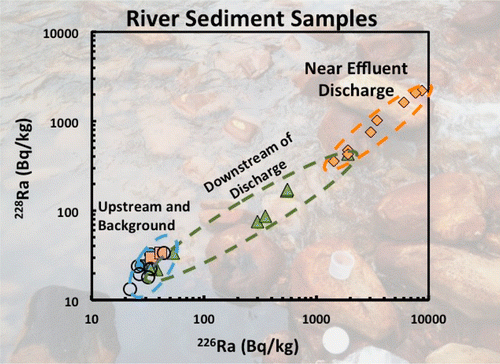Dangerous levels of radioactivity found where treated fracking wastewater is discharged

A new study by Duke University scientists has found elevated levels of radioactivity and other pollution in river water and sediments at a site where treated wastewater from oil and gas fracking operations is discharged into a Pennsylvania creek.
"Radium levels were about 200 times greater in sediment samples collected where the Josephine Brine Treatment Facility discharges its treated wastewater into Blacklick Creek than in sediment samples collected just upstream of the plant," said Avner Vengosh, professor of geochemistry and water quality at Duke University’s Nicholas School of the Environment in Durham, N.C. and one of the study's four authors.
The radioactivity levels in the river sediment were so high that it could be accepted for disposal only at a licensed radioactive waste facility. Levels of radium in flowback water produced from fracking operations in Pennsylvania's Marcellus shale formation are especially high, but naturally occurring radioactive materials are a concern in all shale formations as radium forms from the decay of uranium and thorium that commonly occur in shale rock.
Radium can damage blood and teeth and cause cataracts, and exposure to high levels results in an increased incidence of bone, liver, and breast cancer, according to the federal Agency for Toxic Substances and Disease Registry.
Radium can build up in the food chain, accumulating in soil, plants, animals, and ultimately people. It decays into radon, which can cause lung cancer when inhaled.
"Although the facility's treatment process significantly reduced radium and barium levels in the wastewater, the amount of radioactivity that has accumulated in the river sediments still exceeds thresholds for safe disposal of radioactive materials," Vengosh said. "Years of disposal of oil and gas wastewater with high radioactivity has created potential environmental risks for thousands of years to come.”
The researchers also found high levels of sulfates, chlorides, and bromide at the discharge site. Bromide increases the risk of forming highly toxic disinfection byproducts in downstream drinking water treatment facilities.
The study, titled "Impacts of Shale Gas Wastewater Disposal on Water Quality in Western Pennsylvania," was published today in the peer-reviewed journal Environmental Science & Technology.
The findings have important implications for North Carolina, where the state Mining and Energy Commission is drawing up fracking regulations. After an earlier proposal to dispose of fracking wastewater in deep wells in the eastern part of the state met with opposition, Vikram Rao, chair of the commission's Water and Waste Management Committee and former chief technology officer for fracking giant Halliburton, called for treating the wastewater and then discharging it to the environment or using it for agricultural purposes.
The Duke scientists' findings raise questions about the safety of such practices.
"It is clear that this practice of releasing wastewater without adequate treatment should be stopped in order to protect freshwater resources in areas of oil and gas development," Vengosh said.
Tags
Sue Sturgis
Sue is the former editorial director of Facing South and the Institute for Southern Studies.
